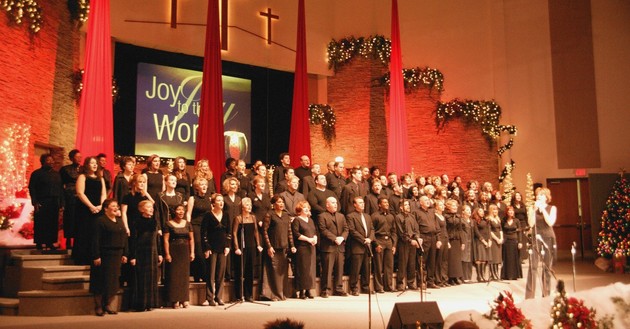4 Things Non-Believers Should Notice in a Christmas Service
- Updated Dec 22, 2016

Over the years of hearing from readers, I’ve learned that not everyone who reads me shares my evangelical Christian convictions. Many of you don’t. Many of you are of other faiths, and some of no faith at all. Some of you are spiritually searching, and some of you see yourselves as committed skeptics. Some of you have no idea what the Christian religion is about, and some of you left a church behind a long time ago, due to some bad situation. Whatever your situation, I have to imagine that at least one of you will be expected to go with your parents or your Aunt Gladys or your son-in-law to a church service on Christmas Eve or Christmas morning. Here are some thoughts about how to make the most of the experience.
Pay Attention to the Singing
Christians don’t always agree on music. Across our traditions, we have everything from Gregorian chant to bluegrass revival songs to hip-hop to, well, some less-than-memorable stuff. Christmas is the time of year, though, when even churches that are normally allergic to theology and biblical narrative in their worship music will have it there. I’m sure there are some churches that will sing “Mele Kalikimaka” or something, in an effort to be “relevant,” but most won’t.
Instead you will hear songs that communicate things such as this: “O come, O come Immanuel, and ransom captive Israel, that mourns in lonely exile here, until the Son of God appear,” or, “Remember Christ our Savior was born on Christmas day, to save us all from Satan’s power when we were gone astray.” Some of these songs may just sound like December mall department store background music, but if you consider the lyrics, you’ll get an insight into why Christians are who we are. We are convinced that this birth, back in a Middle Eastern sheep town, was God joining himself to humanity, to dwell with us forever as our God.
You don’t have to sing. No one will notice or mind. If you want, just stand there and listen and absorb the experience.
Pay Attention to the Awe
Of course, you may be in a church that doesn’t simply sing traditional carols together but that sings through the majestic work of Handel’s Messiah. In that, you can hear the narrative of our story fit together beautifully. What I think you should pay the most attention to, though, is the Hallelujah Chorus near the end. Now, this too, is familiar to you by its pop culture trivialization. You will have heard it when a cartoon squirrel finds a nut or when a bumbling sitcom character wins the lottery. No matter.
This will be different, when you are surrounded by worshipping people. What that chorus can help to give you is just an infinitesimal insight into the Christian sense of awe in the presence of Jesus. That chorus is meant to signal something of the experience of a redeemed people standing in heaven before Jesus, with his reign over the universe now visible. It’s meant to make us feel a kind of smallness before the vast power and mercy of God. That’s kind of like the awe you might feel before the night sky or the Grand Canyon, but instead with a sense that this Presence before you is personal, loves you, and has proven triumphant over every fearful thing.
Pay Attention to the Bible Reading
Now, you may not believe any of the Bible, of course. As an unbeliever or skeptic, you might think it’s just another ancient collection of texts. But listen, with an open mind, to the Scripture. Maybe it will be preached and explained. Maybe it will just be read by someone, or responsively by the congregation. Sometimes you might not know what kind of preaching you will receive in a church. You might find one that does very little with the Bible, and might sound more like life-coaching to you than anything else. Like the music, though, Christmas is one of those times that the Bible will almost certainly be highlighted. What’s more, if you pay attention, you can hear in these readings or explanations the way the whole Bible fits together for Christians.
The birth stories of Jesus, after all, aren’t just “origin narratives.” They demonstrate how the Old Testament Scriptures are fulfilled in this infant’s birth. They reach backward. They also foreshadow how this infant is born to be a sacrifice for sin, to be an ever-reigning king, to bring good news to captives like us. They show this birth breaking down divisions–Jewish people are drawn to Jesus, but so are Gentile stargazers from the East. These texts reach forward. They show how the whole Bible is about Jesus.
I would challenge you to be open-minded. As you hear these beautiful old words, ask yourself, “What if this is true?” And if you’re especially open-minded, I would challenge you to even pray, “God, if you’re out there, would you show yourself to me in this Word?”
Pay Attention to the Brokenness
Most of the people around you probably seem to be happy and all put-together. It’s Christmas, after all. They feel like they have to be. But, if you really pay attention, you can see a lot of hurt. People are remembering loved ones who’ve died or walked out on them. People are thinking of children or parents who don’t speak to them anymore. People are thinking of their own battles with addiction or guilt or shame. Some of these people have been hurt by the church, just as maybe you have. Listening to the actual words of our Scriptures and our songs, though, will show you that Christianity isn’t for well-put-together people.
You will notice that reality in the Christmas story itself. It really isn’t drummer boys and snowmen, but a sometimes-sketchy genealogy, a man narrowly avoiding divorcing his betrothed for perceived infidelity, and a family in flight for their lives from a murderous king. That’s all intentional. Jesus came to save us from our sin and brokenness, and he stepped right into the midst of a sinful and broken world.
Jesus didn’t stay in a manger. He learned to crawl and then to toddle and then to walk, and he kept walking right to a public execution. We believe he was a sacrifice there, carrying away the sins of the world. That’s why we think his message is good news. We’re broken. We’re guilty. We’re a wreck. But Jesus invites us into his life, to find in him peace with God, and, thus ultimately also with each other and with ourselves.
That’s what’s worth considering. Where is this One to whom these people—and people all over the world for 2,000 years–bear witness? Does what he said about us, and about the world, ring true? If so, does what he said about himself ring true? If so, then that means he is alive, and seeking after those who are lost. Consider that. If it’s true—and I have bet my life and my after-life that it is—then “good tidings of great joy” are more than words in a Christmas carol. They are what life really is all about.
Photo courtesy: Thinkstockphotos.com
Publication date: December 22, 2016



















